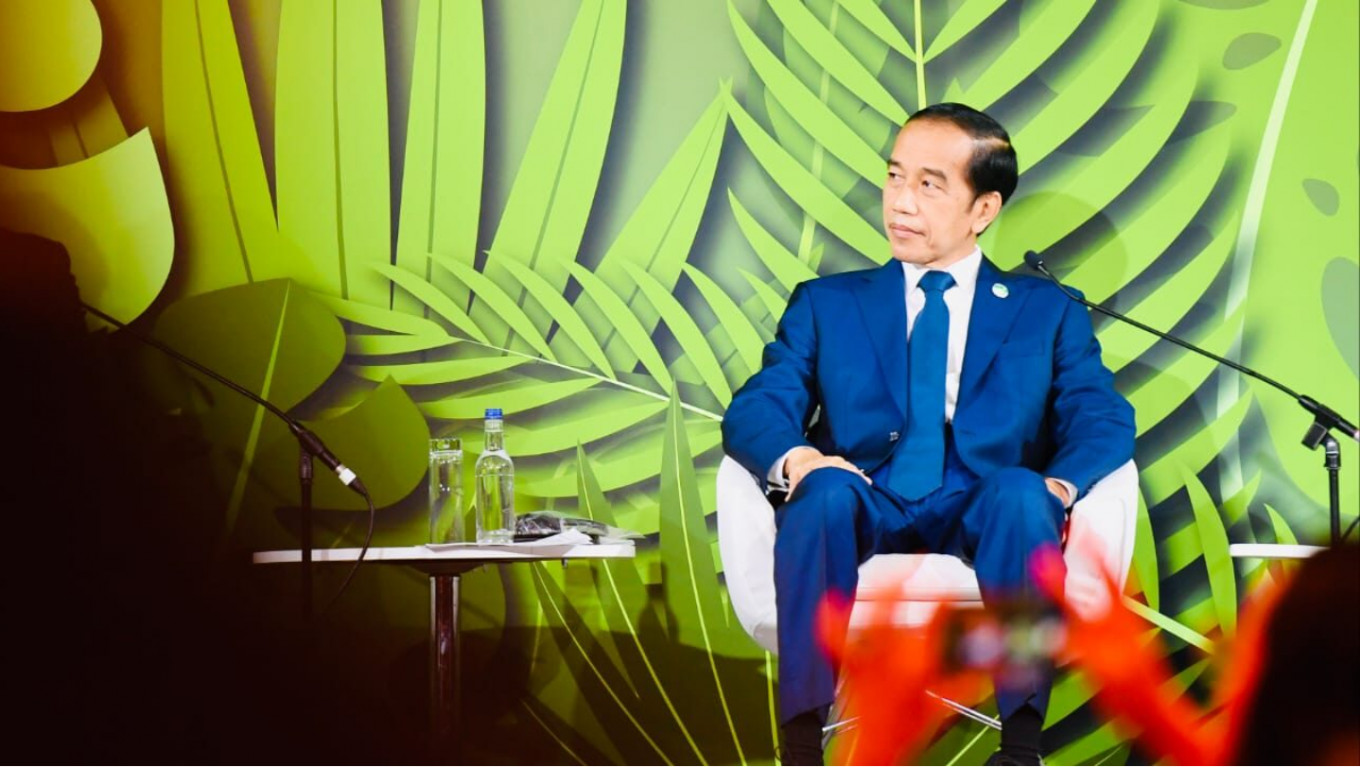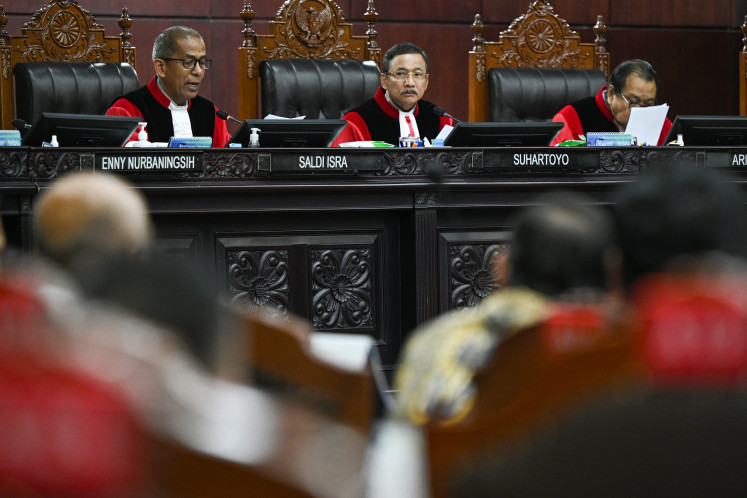Popular Reads
Top Results
Can't find what you're looking for?
View all search resultsPopular Reads
Top Results
Can't find what you're looking for?
View all search resultsThe more ambitious climate action the better for Indonesia’s economy
Indonesia cannot afford to be a laggard on climate action. We must move faster.
Change text size
Gift Premium Articles
to Anyone
I
ndonesia, like many other economies across the world, is gradually recovering from multiple waves of COVID-19 infection. Meanwhile, we are at a pivotal juncture in dealing with climate change, as the cost of climate impacts begins to mount and our window for action narrows.
Climate change has many dangerous implications for Indonesia. Indonesia’s gross domestic product (GDP) could shrink by 16.7 to 30.2 percent because of the impacts of climate change if the world is 2 to 2.6 degrees Celsius warmer by mid-century, according to recent analysis by the insurer Swiss Re. Indonesia also ranks as the most vulnerable to climate change impacts among the 48 countries analyzed.
Yet, climate action is also a huge opportunity. With system-changing green interventions in key economic systems, Indonesia could reach net-zero emissions by as early as 2045, while achieving strong, resilient growth.
Over the summer, the Intergovernmental Panel on Climate Change (IPCC) published a landmark new report showing that this decade is our last chance to take action to limit a global temperature rise to 1.5 degrees and avoid severe climate disruptions that will throw the world’s economy and natural systems into chaos. To succeed, we must slash emissions in the 2020s and reach net-zero by mid-century.
United Nations Secretary-General Antonio Guterres called the report a “code red for humanity”, but unfortunately the warning fell on deaf ears as evident in the absence of a unified commitment among nations during the UN Climate Change Conference (COP26), which ended last Friday.
In fact, we are seeing the impacts of climate change already. Jakarta, the world’s fastest-sinking city, consistently ranks among the world's worst cities for air pollution. In April, tropical cyclone Seroja, one of the most powerful ever to hit Indonesia, killed 181 people. It is clear that business as usual is not an option.
Global leaders, brought together under the Paris Agreement, have responded. At the 76th session of the UN General Assembly in September, President Xi Jinping stated that China would no longer build coal-fired power projects abroad. This followed similar announcements from Japan, South Korea and the rest of the Group of 7, representing a historic turning point away from coal. Investors and markets are also shifting away from risky high-carbon infrastructure
![]() Climate change is a top priority for Indonesia. In his speech at COP26, President Joko “Jokowi” Widodo highlighted Indonesia’s efforts to use its abundant natural resources as part if its key strategies to lower its carbon emissions, including generating a low carbon economy, targeting the forestry sector to be a net-carbon sink by the end of this decade and developing and supporting green economy infrastructure such as electric vehicles and the construction of the largest solar power plant in Southeast Asia.
Climate change is a top priority for Indonesia. In his speech at COP26, President Joko “Jokowi” Widodo highlighted Indonesia’s efforts to use its abundant natural resources as part if its key strategies to lower its carbon emissions, including generating a low carbon economy, targeting the forestry sector to be a net-carbon sink by the end of this decade and developing and supporting green economy infrastructure such as electric vehicles and the construction of the largest solar power plant in Southeast Asia.
This movement is great and needs to be scaled up further. Indonesia cannot afford to be a laggard on climate action. We must move faster.
The numbers are clear—ambitious climate action is good for Indonesia’s economy. New analysis from Indonesia’s Low Carbon Development Initiative (LCDI) spearheaded by the National Development Planning Agency (Bappenas) shows that embracing a net-zero emissions by the mid-century pathway, starting with a green recovery from COVID-19, could accelerate growth, boost income, create jobs and make Indonesia’s economy more competitive, robust and resilient.
Using cutting-edge economic modeling that reflects the effects of the COVID-19 pandemic and the costs of inaction, the research shows that more ambition leads to more benefits, including greater GDP growth and higher GDP per capita. For example, reaching net-zero by 2045 increases average per capita income by US$3,785 compared to business as usual, which is more than the boost of only $2,790 under net-zero by 2060.
Net-zero policies, which can be implemented as part of COVID-19 recovery measures, will also immediately create millions of new jobs, reduce air pollution and significantly improve climate resilience.
For example, LCDI scenarios call for scaling up mangrove restoration to 125,000 hectares per year between 2021 and 2024, scaling up peatland restoration to 90,000 ha per year between 2021 and 2030 and implementing policies to completely end deforestation by 2025. These actions could create new jobs in forest, peatland and mangrove restoration activities, improve air quality, lower heat stress, help stem land subsidence, reduce flood risks, protect coastal areas and more.
In addition, LCDI’s net-zero scenario in the energy sector has a set target to increase the share of renewable energy in the primary energy mix to 65 percent while scaling up the renewables to reach 60 percent of total power generation capacity by 2030. These sectors combined could result in 1.8 to 2.2 million additional green jobs by 2030.
Reaching net-zero will require significant investments. The costs of the LCDI pathways would start at around $20 billion per year in 2021to 2022 and average $150 to 200 billion per year in 2021to 2030. Luckily, Indonesia is blessed with abundant natural capital that will help it attract necessary financing. Additionally, phasing in a carbon price starting at around $2.1 per ton equivalent CO2 in 2022 and removing fossil fuel subsidies could together generate substantial revenue.
The numbers are clear: the faster Indonesia reaches net-zero, the greater the benefits. There is no time to go backward. Indonesia’s businesses must adjust to the new reality and be prepared to pivot quickly. This is our moment to be confident and work to create the change we need to create a future where businesses and people can survive and thrive.
***
The writer is a House of Representatives’ Commission VII member and Low Carbon Development Initiative (LCDI) commissioner.










